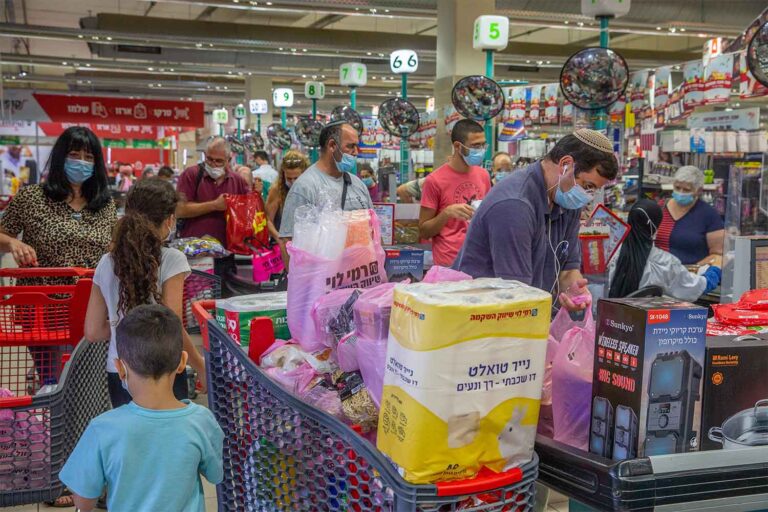
In the last weeks, supermarkets have been all over Israeli news. Last Tuesday, the Competition Authority – the government watchdog responsible for maintaining economic competition – raided the offices of Shufersal, Israel’s leading supermarket chain, on suspects of violations of competition law.
Shufersal was accused of opening a separate website with lower prices for the Haredi sector, prompting outrage from the secular community, and opening broader inquiries into suspicions of cartel behavior and price-fixing among major suppliers and supermarket chains.
In addition, the Knesset’s Economics Committee conducted a lively debate among the leading CEOs of the major supermarket chains on the cost of living.
Section 30 of the Food Act stipulates that each one of the major food chains is obligated to publish the prices of the products in their branches digitally and with easy access to the consumer. Any change in prices must be updated within an hour. The law is designed to enable consumers to make informed decisions on their purchasing.
A beautiful idea, but aside from particularly media-savvy consumers, the general public does not use these databases particularly often. However, the service still has loyal customers: the retail chains themselves, who have become its major users.
For the supermarket chains, this is a real gold mine: instead of doing the legwork and going around to dozens of supermarket branches, they can browse the sites and know immediately the prices competing chains are offering, and set the consumer price accordingly. Online price coordination in practice.
This is just one section of the Food Act, enacted in 2014, and not necessarily its central one. However, its implementation raises questions about the gap between the stated attempt to produce fair competition between chains, and the reality on the ground.
Advanced customers, who go shopping at the supermarket only after conducting a comprehensive price survey across all the sites, exist only in the prolific imagination of legislators, and are lightyears away from the tired consumer who goes shopping at the end of a work day at the supermarket closest to their home.
The issue of prices has recently come up for public discussion with an inquiry of the managers of the major local chains, and inflation in Israel and around the world. The question arises: does the state at all succeed in influencing the prices set in the private market, and protect the individual consumer against the giant corporations?

***
Those who attended the discussion in the Economics Committee last week were not particularly moved by Rami Levy’s performance. Levy, CEO of the supermarket chain in his name, came to the committee looking for a fight, and showed impatience from the beginning of the hearing. Being escorted out by security may not have been pleasant for Rami Levy the man, but not a bad result for Rami Levy the brand. This image of struggling in the Knesset certainly doesn’t hurt Levy, who has managed to position himself as an anti-establishment fighter for a lower cost of living.
Before he left, Levy managed to get his point across: “The state is the biggest monopoly, it is the reason for the high cost of living. I suggest we get our own house in order, our profitability is just like in any other country in the world.”

Profitability is an accepted measure of the size of the profit margin established by the chains, in which they mediate between the producer and the consumer. In the food sector, profitability is in the 2% range. A review of Rami Levy’s financial statements reveals that Levy is inaccurate. The profitability of the chains may not be exceptional compared with developed countries in Europe, but it is relatively high.
The profitability of the Rami Levy chain was 2.7% ( 175 million shekels) in 2020, slightly above the industry norm. This year, profits have already gone up. By June, the chain’s profitability was 3.3%. The profitability of the major competitor, Shufersal, was 2.7% during this period.
However, it is difficult to know what lies behind the numbers. In order to isolate profit in the food sector, a more in-depth examination is required on the part of the government, which must respond to Levy's challenge to review state industry legislation.
***
Levy spent the rest of the day questioning the Competition Authority. In doing so, he joined Shufersal CEO Itzhak Aberkohen, CEO of ‘Victory’ Eyal Ravid, CEO of food supplier ‘Diplomat’ Noam Weiman, and senior members of the Strauss Group.
The details of the authority’s investigation have not yet been released, but it seems that some of their suspicions relate to interviews given by the chain owners in the media, that their messages about the need for price increases are addressed not only to consumers, but to each other. In doing so, they are ostensibly adjusting prices, which would hurt competition.
The Competition Authority is also examining the possibility that the chain managers and suppliers conducted discussions on consumer prices, which is prohibited under the Competition Law, according to various reports in the past week. There is a thin line between a legitimate discussion and a cartel conspiracy.
These suspicions nicely reflect the cat-and-mouse games between the Competition Authority and the big chains: in the food retail market, size is a crucial economic advantage, and the giant chains unquestionably dominate the market. The regulator is trying to place limits on their power, mainly through various constraints, which are supposed to keep the market competitive despite the chains’ significant market share and the resources at their disposal.
What is the power of regulation? The law, for example, allows a state to require a supermarket chain to sell one of its branches if it gains too great an advantage in a particular geographical region. The result: owners of retail chains must compete with one another, but there must be no one clear winner.
***
The state can influence prices in other ways. It can, for example, oversee some of the prices. While in Israel, direct price control is perceived as an outdated approach, in many developed countries it is a legitimate and effective tool. Many countries use it as part of their regulatory toolbox because it proves to be a useful mechanism for ensuring prices are kept fair for the consumer.
Obviously not all prices need to be monitored, but it is enough for some products to be under control in order to achieve a preventative effect on undue price increases.
Another way to moderate the rise in prices is to try to neutralize some of the advantage that the giant chains enjoy at the expense of the small competitors. Two proposals in this spirit were brought before the Knesset's Economics Committee for discussion: the renewal of the wholesale market; and the establishment of a forum of grocery stores that will constitute a group purchasing organization for small retailers against large suppliers.
The government decided to renew the wholesale market twenty years ago, but failed to implement the decision. A wholesale marketplace receives a large quantity of goods and then distributes them to the retailers, cutting out the middleman, or supplier. Such a market would break the monopoly of food chains along the supply chain, creating more competition between them for the purchase of agricultural goods. A situation like this would strengthen farmers, and may lead to falling prices.
The establishment of a forum of grocery stores is also a decision that has already been made as part of the reforms in the food industry, but its implementation is flawed. Food suppliers and producers do not cooperate with the forum, and it remains an empty framework.
***
It is possible that the rise in the prices of goods and fuel in the world requires an update of some of the prices in Israel. On the other hand, the fall in fuel prices and the weakening of the dollar in recent years have not led to a fall in prices. It seems as if there is only one direction for the prices of retail chains to go – up.

The Economics Committee, headed by Member of Knesset Michael Biton, has set itself the task of overseeing the conduct of the major chains. During the height of the pandemic in the last year,, when Israelis stayed in Israel and the restaurants were closed, the chains made a nice profit. The public demand from the retail chains could be this: first the profits must fall, then we'll talk about the price.
And there is also the other side of the cost of living: wages. The faster wages increase, the lower the actual cost of living will be. Raising the minimum wage and additional wage agreements are the most effective struggle against the high cost of living in Israel.






